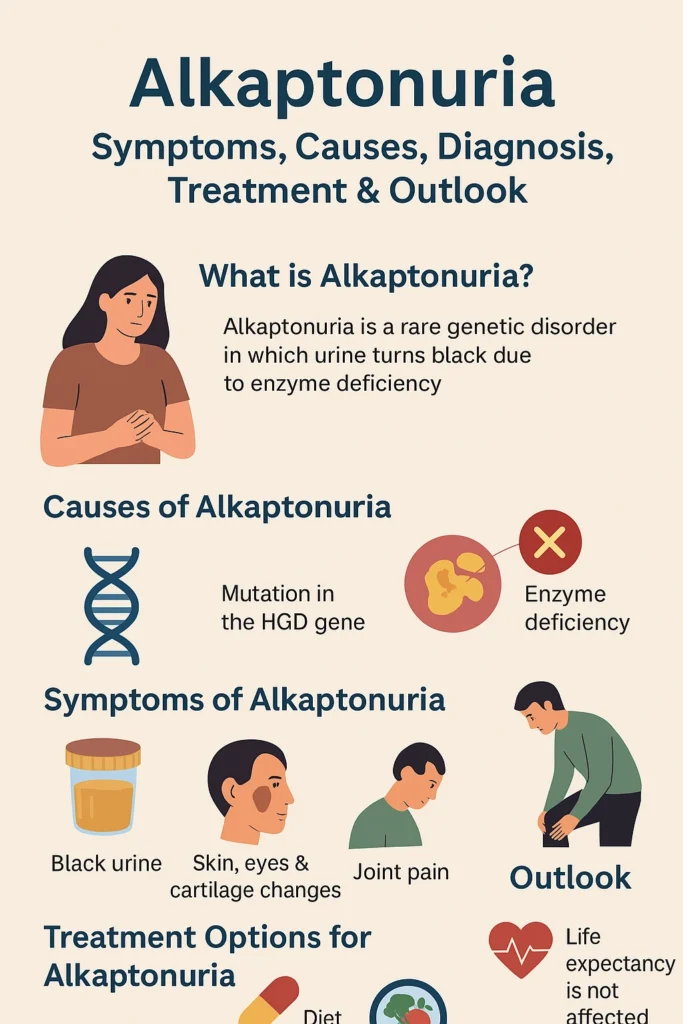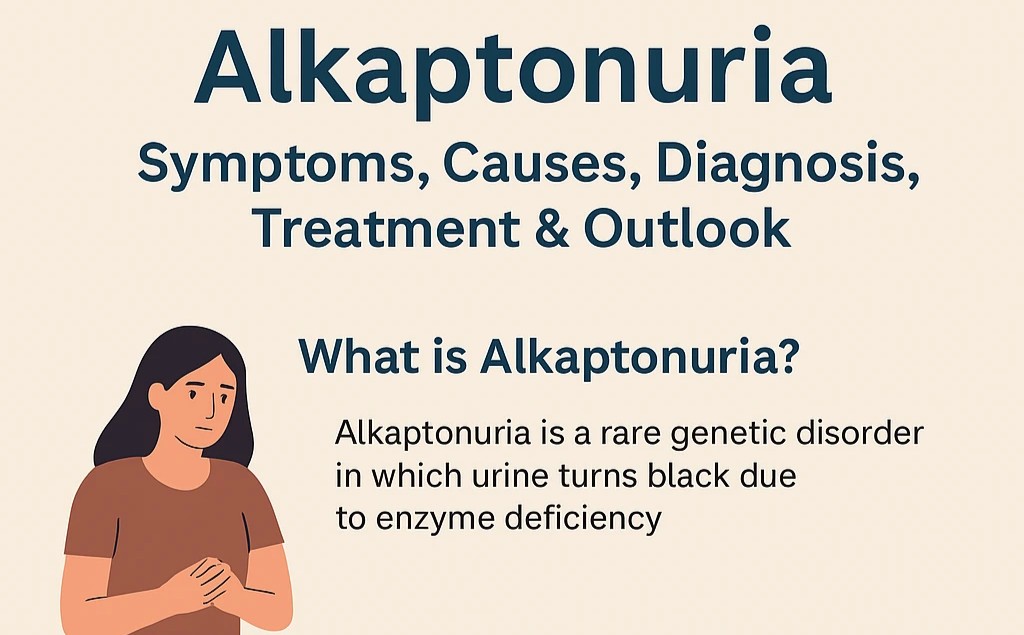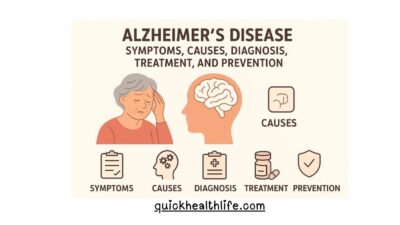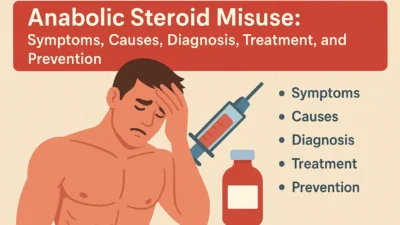What is Alkaptonuria?
Alkaptonuria (pronounced al-kap-toe-NEW-ree-uh) is a rare genetic disorder that affects how the body breaks down certain amino acids. In simple terms, it happens when your body cannot process homogentisic acid due to a missing enzyme called homogentisate 1,2-dioxygenase (HGD).
Because of this enzyme deficiency, a substance builds up in the body and makes urine turn black when exposed to air. Over time, this build-up can affect bones, joints, and heart health.
Table of Contents
How Rare is Alkaptonuria?
Alkaptonuria is very rare, affecting about 1 in every 250,000 to 1,000,000 people worldwide. In India, only a handful of cases have been reported. Because it’s so uncommon, many people don’t know about it until symptoms appear later in life.
Causes of Alkaptonuria
The main cause of alkaptonuria is a mutation in the HGD gene, which prevents the body from producing the enzyme needed to break down homogentisic acid.
- Genetic inheritance: It is an autosomal recessive disorder. This means a child needs to inherit defective genes from both parents to develop the disease.
- Enzyme deficiency: Without HGD enzyme, homogentisic acid builds up, leading to black urine and damage to tissues over time.
Symptoms
Alkaptonuria symptoms often start in childhood but become more noticeable in adulthood.
Black Urine in Alkaptonuria
- The most striking sign is urine that turns dark or black when left standing.
- Parents may notice dark stains in a child’s diaper.
- This is due to homogentisic acid oxidizing in air.
Skin, Eyes & Cartilage Changes
- Bluish-black spots may appear on the ears, eyes, or skin.
- Cartilage becomes discolored, a condition called ochronosis.
Bone & Joint Complications
- By age 30–40, many people develop severe arthritis.
- Symptoms include:
- Back pain and stiffness
- Joint pain in hips, knees, and shoulders
- Limited mobility
Alkaptonuria vs Phenylketonuria
People often confuse Alkaptonuria with Phenylketonuria (PKU), but they are different:
| Feature | Alkaptonuria | Phenylketonuria (PKU) |
|---|---|---|
| Cause | Lack of HGD enzyme | Lack of PAH enzyme |
| Main Effect | Black urine, arthritis, ochronosis | Intellectual disability if untreated |
| Age of Onset | Urine discoloration from infancy | Detected in newborn screening |
| Treatment | Diet, vitamin C, nitisinone | Strict low-phenylalanine diet |

How is Alkaptonuria Diagnosed?
Doctors use several tests to confirm alkaptonuria:
- Urine test: Black or dark brown urine after standing is a clear sign.
- Genetic testing: Confirms HGD gene mutation.
- Blood test: Measures homogentisic acid levels.
- Imaging (X-rays, MRI): To check for arthritis and bone damage.
Treatment
Currently, there is no complete cure for alkaptonuria, but treatments help manage symptoms.
Role of Diet & Vitamin C
- Vitamin C supplements may slow tissue damage.
- A low-protein diet helps reduce acid build-up.
Nitisinone in Alkaptonuria
- Nitisinone is a promising drug that reduces homogentisic acid production.
- Clinical trials show it may slow disease progression.
Pain & Arthritis Management
- Physical therapy to keep joints flexible.
- Pain relievers for arthritis symptoms.
- Joint replacement surgery for severe damage.
Living with Alkaptonuria
With proper care, people can live a relatively normal life. Recommendations include:
- Regular checkups with a specialist.
- Healthy diet and exercise.
- Avoiding activities that strain joints.
- Using supportive devices if arthritis worsens.
Outlook & Life Expectancy
Alkaptonuria does not shorten life expectancy drastically, but it reduces quality of life due to pain and mobility issues. With modern treatments, many patients live into their 70s and beyond.
Alkaptonuria PPT & Study Material
Medical students often search for alkaptonuria ppt for study purposes. These presentations typically include:
- Disease overview
- Genetic causes
- Symptoms and diagnosis
- Case studies
- Treatment options
FAQs on Alkaptonuria
Q1. What is Alkaptonuria?
Alkaptonuria is a rare genetic disease where urine turns black due to enzyme deficiency.
Q2. What is the pronunciation of Alkaptonuria?
It is pronounced as al-kap-toe-NEW-ree-uh.
Q3. Does Alkaptonuria cause black urine?
Yes, the most noticeable symptom is urine that turns dark or black when exposed to air.
Q4. What enzyme is missing in Alkaptonuria?
The missing enzyme is homogentisate 1,2-dioxygenase (HGD).
Q5. Can Alkaptonuria be cured?
No permanent cure, but treatments like nitisinone, diet, and surgery help manage symptoms.
Q6. What is the difference between phenylketonuria and alkaptonuria?
Phenylketonuria affects brain development, while alkaptonuria mainly causes black urine and joint damage.




[…] Read More: Alkaptonuria Symptoms, Causes, Diagnosis, Treatment & FAQ […]
[…] Read More: Alkaptonuria Symptoms, Causes, Diagnosis, Treatment & FAQ […]
[…] Read More: Alkaptonuria Symptoms, Causes, Diagnosis, Treatment & FAQ […]
[…] Read More: Alkaptonuria Symptoms, Causes, Diagnosis, Treatment & FAQ […]
[…] Read More: Alkaptonuria Symptoms, Causes, Diagnosis, Treatment & FAQ […]